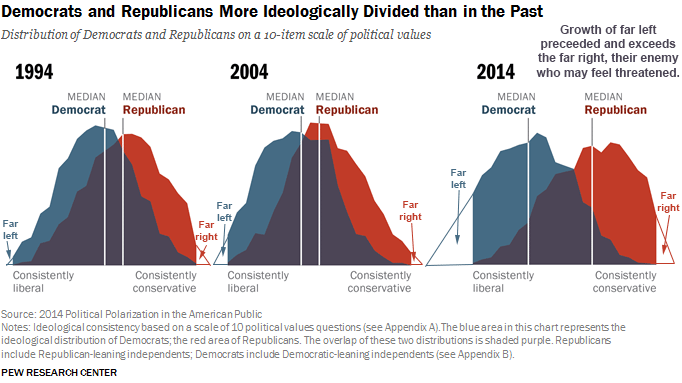
FRIDAY, DEC 20, 2019: NOTE TO FILE

Reality 101 by Video
Why be clueless?
Eric Lee, A-SOCIATED PRESS
TOPICS: STUDENTS, FROM THE WIRES, WHAT CITIZENS SHOULD KNOW WHO WOULD RATHER KNOW THAN BELIEVE
Abstract: A guide to the video content of professor and way cool dudeist Nate Hagens.
COOS BAY (A-P) — Dr. Nathan J. Hagens teaches 'Reality 101 – A Survey of the Human Predicament' as an Honors Seminar for students at the University of Minnesota. About six hours of 34 video bits averaging 11 minutes each covers the content.
More recent is a short course version for freshmen students in an hour and twenty odd minutes. Arguably a reasonable expectation is that by graduation one's grasp of Reality 101 is not facepalmingly fragile. But with only a few exceptions, such as Hagen's students, few who graduate from top universities have even an elementary grasp of biophysical reality. All students should have been prepared to think in systems before doing the reading, writing, and arithmetic thing. They would then be ready for Hagen's short course as freshmen in high school and the full course as high school seniors. But the education system is broken.
For a good start consider:
The Resilience Gathering - Keynote Address
"The Human Predicament", 58 minutes, 6,603 views, Jul 1, 2019.
and read Economics for the Future.
The Short Course in Reality 101
#1: Metacognition in the Anthropocene, 754 views |
#2: The Fossils that Power the Global Economy, 516 views |
#3: The Real Stock Market,
380 views |
#4: Finding Resilience in an Age of Turbulence,
383 views |
Top videos (i.e. music videos) get views in the billions. Expect informed citizens to make good decisions (about what videos they find enjoyable to watch) and vote their deeply held preferences. Nate and his students also get a vote.
The full course is in three sections and if you've watched the above five, follow the below links.
Section 1 – Brain & Behavior in 10 parts
Section 2 – Energy & Economy in 16 parts
Section 3 – The Big Picture in 8 parts
Also, similar to the first, is Nate's Earth Day 2019 talk in 46 minutes, uploaded Apr 27, 2019 as was the short course:
Earth vs. The Amoeba
8,316 views
And just because you can, read an article based on Hagen's 2018 Earth Day talk and/or watch the video.
And also viewed:
Nate Hagens at Kansas Wesleyan University April 23, 2018, 1:18 minutes, 5,619 views.
And:
20 Big Modern Myths Nov 15, 2019, 48 minutes, and Nate got a haircut.
One myth Nate claims is 'Myth: Overpopulation is the problem'. This is true if read as 'Myth: Overpopulation is THE problem'. No it is not THE problem. But Nate goes on to obfuscate, to reinforce popular liberal unthinking about 'overpopulation'. So, yes, 7.8 billion humans is unsustainable. 'But do we have a population problem?' Nate implies we don't as the trajectory of the global population growth rate (as distinct from population) peaked about 1969 and has been rapidly declining since. The problem is that 'we have 80 million net births of human babies [slide shows a white baby]... and .'100 million net births of cars... so which is the larger problem? An American baby expecting to consume like we [the nearly all white audience] have... so is it population that is driving the problem or is it our [elite consumers] unbelievable, unstoppable urge to grow GDP?' [There are about 131 million births per year and 56 million deaths (so 80 million net births is close enough), and 70 million cars produced per Google so how can there be 100 million 'net births'? If 30 million cars die per year....]
Nate misspoke as a public intellectual to members of HumanistsMN. I well know the demographics of such groups and it doesn't get anymore humancentric or Left-leaning progressive, and referencing the concept 'overpopulation' outside that of 'myth' is unthinkable to most of the assembled. Nate ends up noting right enough that 'our predicament is a combination of both population and consumption' before quickly moving on to the next myth.
I had to stop and rewatch several times. Somehow both my wife and I got the impression that overpopulation, other than perhaps of white American/Euro babies who consume too much, is not a problem. What even humanists need to know is that it is population x consumption, that we are well into overshoot, and population is THE distal driver/cause of species extinction/ecocide/climate change, etc., apart from which there are NO CONSUMERS to overconsume like all we Anthropocene enthusiasts are doing, whether living in a penthouse or on the streets, or selling bushmeat to buy whatever. Is it elite consumers who are laying waste to Madagascar?
[Yes, it is elite global consumers and producers/extractors (and wage slaves working for $1/day) that are providing inputs (e.g. food) that enable the population of Madagascar to keep on consuming locally produced charcoal and exporting stuff (and growing the population and economy) for a time, but elites from the Global North and South aren't the only ones driving ecocide in Madagascar and elsewhere. We are all part of the remorseless dynamic.
There is no basis for claiming as some do (Nate doesn't), that 'the Global South doesn't have a population problem' outside of politicized discourse. Ask the faculty/students at top universities if the Global South has a population problem. This is doable; let me know the results.] That there are political solutions to the human predicament is a myth, perhaps THE myth. But I could be wrong.
But it Just Keeps Getting Better
33 Core Myths, Earth and Humanity: Myth and Reality, May 16, 2021, 2:52, and Nate gets a beard.
About 2:15 into his summation Nate notes that we humans do not have a consensus view of the future. I was mildly amused that he labeled one of them on the far-left. I prefer content that doesn't move until I'll had time to plod over it. So I did a screen capture and eventually wondered where, as an extreme cornucopian optimist, my POV would go. I added the white curve and labeled it as all of my views are the better view or I would change them.
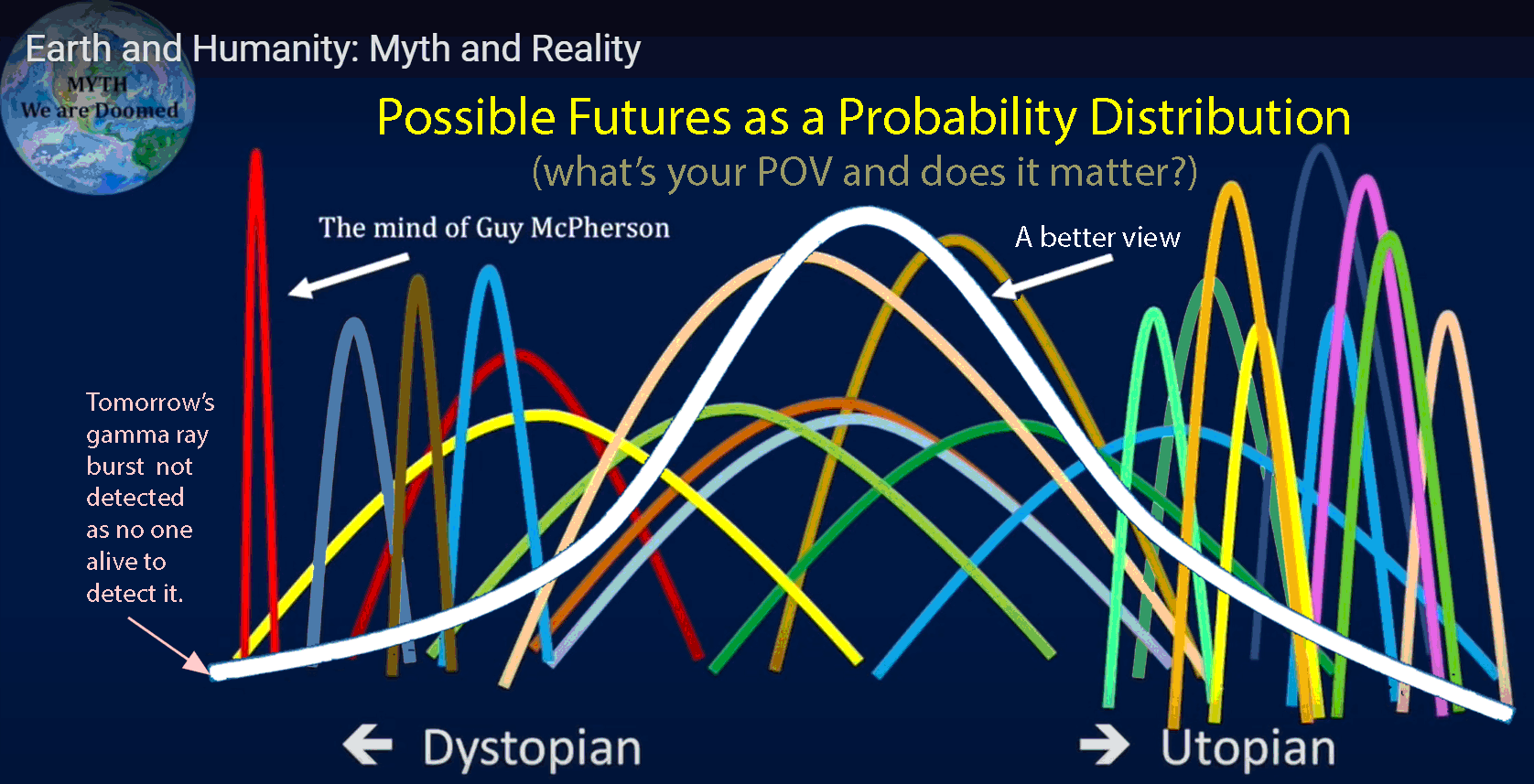
My vision of our future is on the far-right. We are a most promising species. Perhaps in only a few tens of millennia we will come to sort of understand the planet (Gaia) enough to persist sustainably because we've actually learned to live with it (her) properly (worshipfully as 'agents of the Earth' [H.T. Odum]).
I've detailed a pathway towards evolvability. Guy's POV is vastly of greater interest. (Note that my eudemonic vision is of a brave new world lacking such modern techno-industrialized humans of NIMH as me in it.)
Nate shared (tweeted) this short, but I'm not sure why:
Of course peer review, if actually done and done well, is essential in science as is observation. Allan Savory is a fringe ecologist who makes claims that peers may have legitimate issues with as do their students. Savory believes he is right and the mainstream wrong, so his complaints may be over stated. Yet consensus thinking is alive and well and doing harm in science as in all fields (as is motivated reasoning and citing of selected evidence). H.T. Odum was also viewed as having idiosyncratic views and the scientific community has yet to embrace Odum's 'better view'. My guess is that Odum will be viewed as ahead of his time by historians of science in the 22nd century.
1: Energy Blind
So in just 6-12 hours you'll hear everything you really need to know and get the straight dope, right?. Well, you'll have a good start on understanding life, the universe and everything. But understand that any introducer of 101 content that all normal humans find dissonant has to come with some sort of cherry on top (or as many as will fit) as few, even after adding a PhD to their name, can take their science straight up black.
Eventually an educated person should be able to understand why humans may have transitioned into overshoot about four thousand years ago as unsustainable empire-builders and that to 'get right with Mother' and actually understand/live properly with the planet could take another thousand years assuming humans don't go extinct first (or remain time and energy blind). You won't be getting the straight up black version in the videos, so brave new minds may consider Carrying Capacity and Overshoot. There is nothing in this article Nate Hagens doesn't know, merely some information that falls outside the Overton window of most humans.
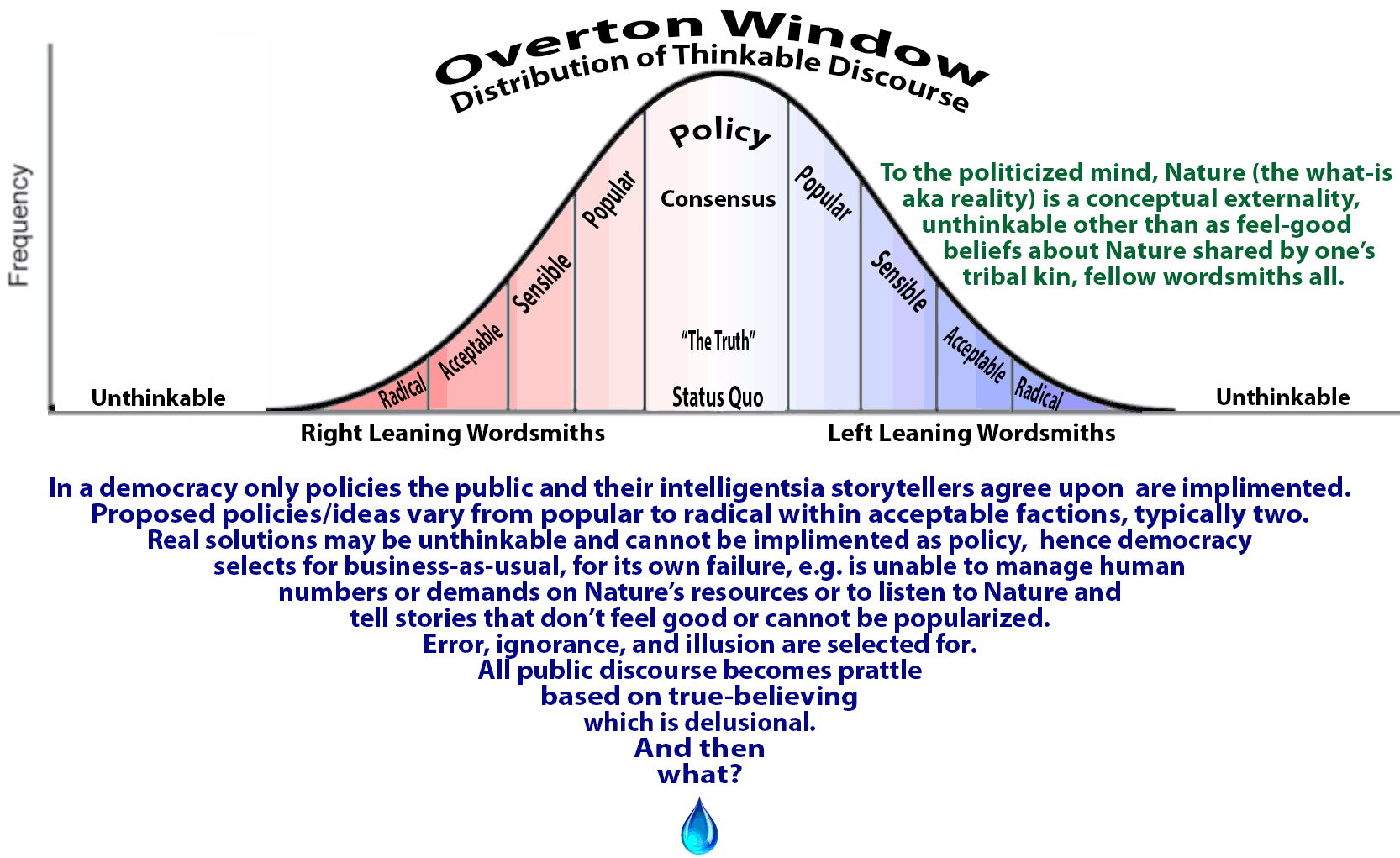
Nate summarizes why scientists, academics, CEOs, NGOs, the rich, the famous, the thought leaders (and other leaders, e.g. politicians) are unable to see the coming energy/overshoot crisis that is outside their Overton window:
- EVERYONE believes in their own world view [EVERYONE believes in belief].
- The more power/influence one has, the less likely ones views will change. Ever.
- Very few people can think in systems terms. They are experts in their one area.
- People defer to the most respected, influential person in the room — a natural ape instinct. And since the people at the top are techno-optimists who think fossil fuels can be replaced with renewables at little cost, everyone below blindly believes likewise.
"It is quite possible to graduate from Stanford—arguably one of the best universities in the world—without knowing anything of significance about the impacts of population growth, the second law of thermodynamics, ecosystem services, total fertility rates, how the climate works, externalities, exponential growth, the food system, the biology of race, nuclear winter, the limits to growth, Federalism, the history of fascism, or many other topics of critical importance to modern citizens." —Paul & Anne Ehrlich.
2/23/2022 SUBNOTE TO FILE:
Everyone tells stories and there are no true stories. But some stories are better (lower error, ignorance, and illusion content) than others. For an example of storytelling as usual in support of business as usual, consider the progressive narrative of The Story of Stuff 2007 infomercial with 7.85 million views.
At 19:03 we are told, "So you see, it is a system in crisis. All along the way, we are bumping up against limits from changing climate to declining happiness. It's just not working. But the good thing...." and the rest is delusional prattle about political solutions. The story is based on the YES!-(but...) fallacy. Pretty much every point made in the first 19 minutes is reality-based—credible evidence can be cited for the story. Then the sleight of mind trick so deft those who made the video (and watch it) are completely unaware of it, unaware that every claim made in the next two minutes is a non-sequitur.
To skip the YES! stuff and get to the questionable but... stuff, here's the last 1:28 transcribed:
But the good thing about such an all pervasive problem is that there are so many points of intervention. There are people working here on saving forests and here on clean production. People working on labor rights and fair trade and conscious consuming and blocking landfills and incinerators and, very importantly, on taking back our government so it is really is by the people and for the people. All this work is critically important but things are really gonna start moving when we see the connections, when we see the big picture. When people along this system get united, we can reclaim and transform this linear system into something new, a system that doesn’t waste resources or people. Because what we really need to chuck is this old-school throw-away mindset. There’s a new school of thinking on this stuff and it’s based on sustainability and equity: Green Chemistry, Zero Waste, Closed Loop Production, Renewable Energy, Local living Economies. It’s already happening. Now some say it’s unrealistic, idealistic, that it can’t happen But I say the ones who are unrealistic are those that want to continue on the old path. That’s dreaming. Remember that old way didn’t just happen. It’s not like gravity that we just gotta live with People created it. And we’re people too. So let’s create something new.
I've been hearing variations of the above for 50-60 years; meanwhile the pace of planetary destruction has not slowed. I can re-frame the narrative in four graphics, knowing that no one will Like or Share reality-based claims.
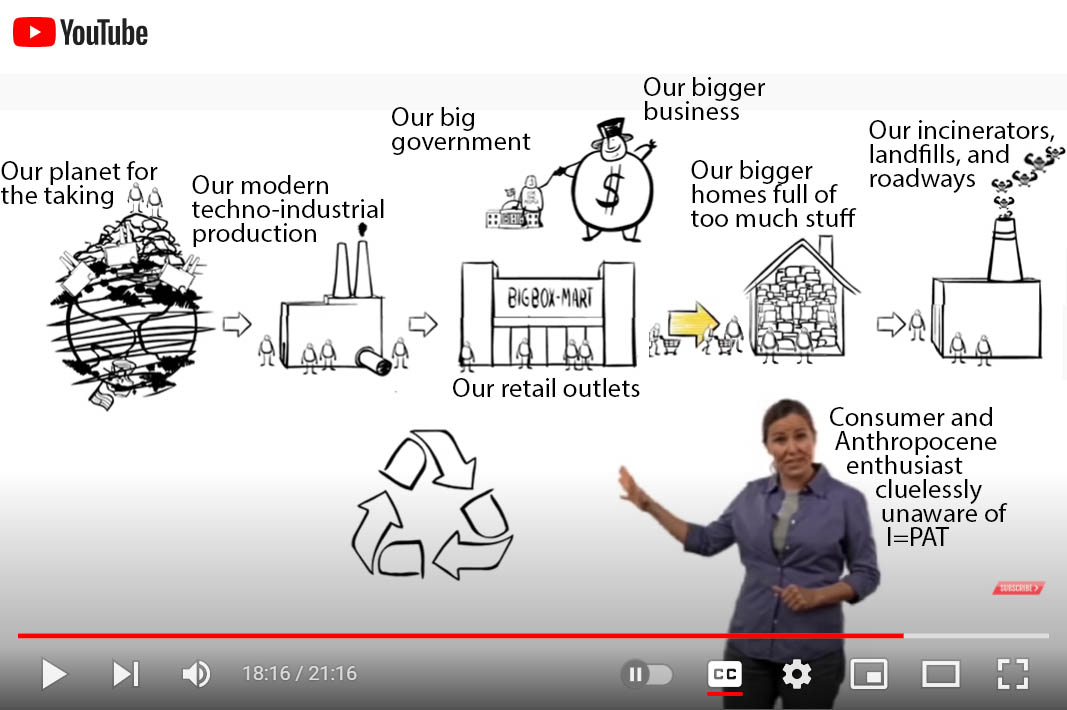
Of course a more popular (among consumers) story is that our predicament is the fault of too-big business, the evil usurpers of our democratic government whose servants came to serve moneyed-interests instead of middle class consumers and their self interests, who all (mostly all) want a green economy based on lots of renewable energy (too cheap to meter).
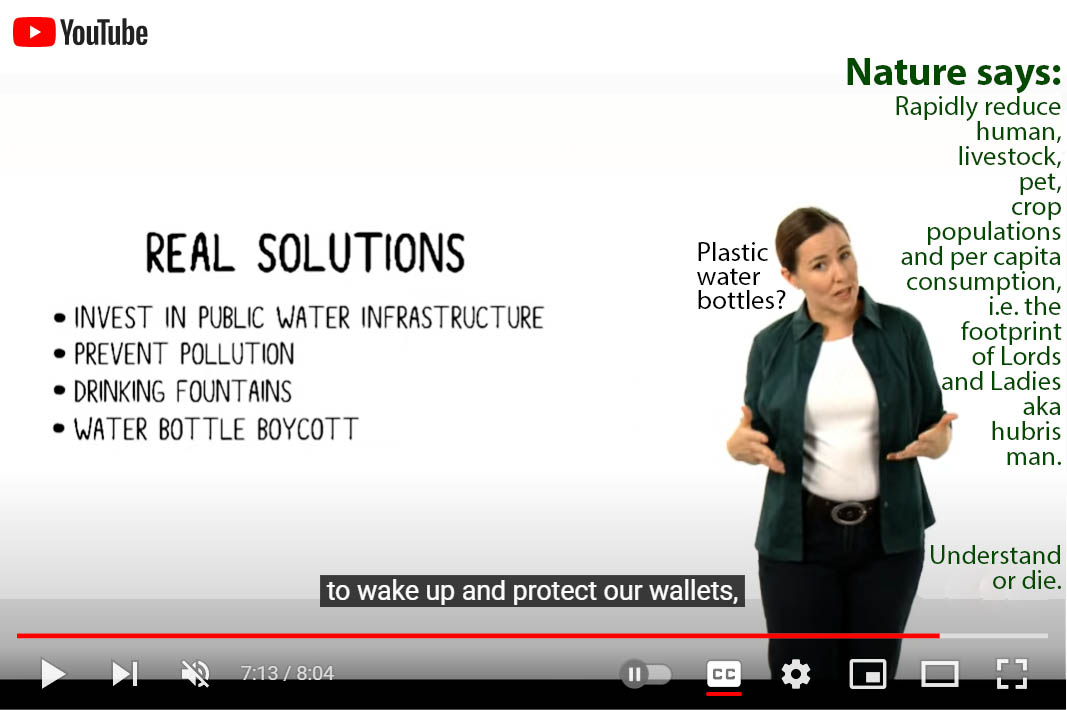
Humans are not subject to Nature's laws, to thermodynamics, carrying capacity, overshoot.... we made modern techno-industrial society, so we and remake it at will.
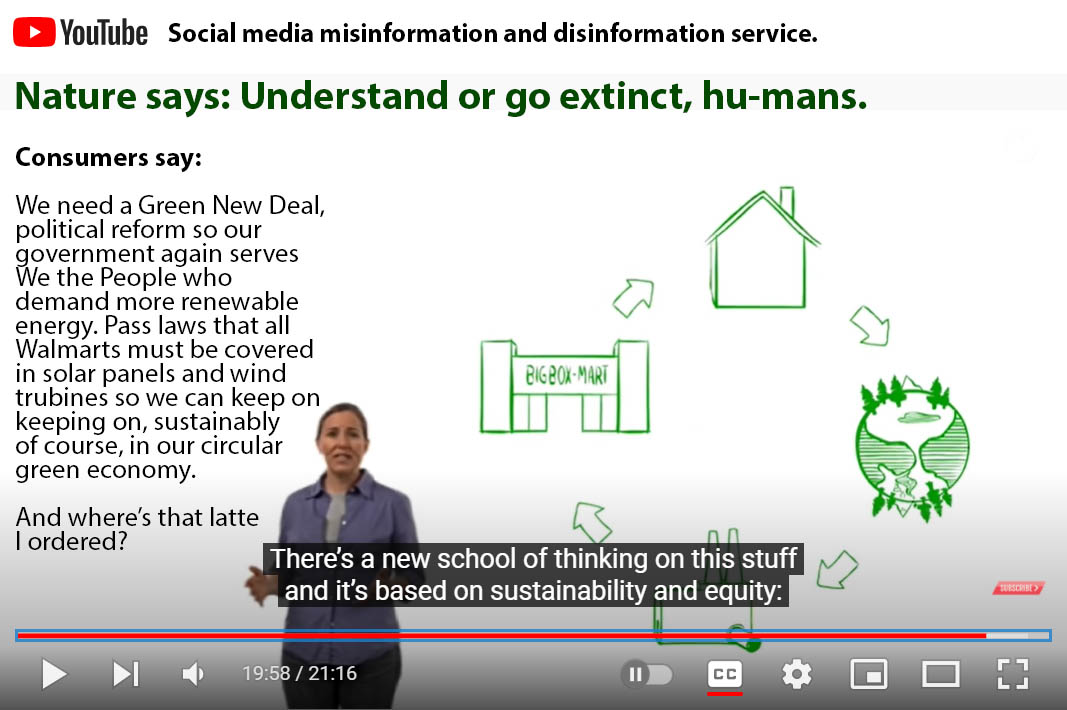
No, sorry, wrong story. Life will be as good or better in a greener future for all because green growth will more equitably distribute stuff, sustainably of course.
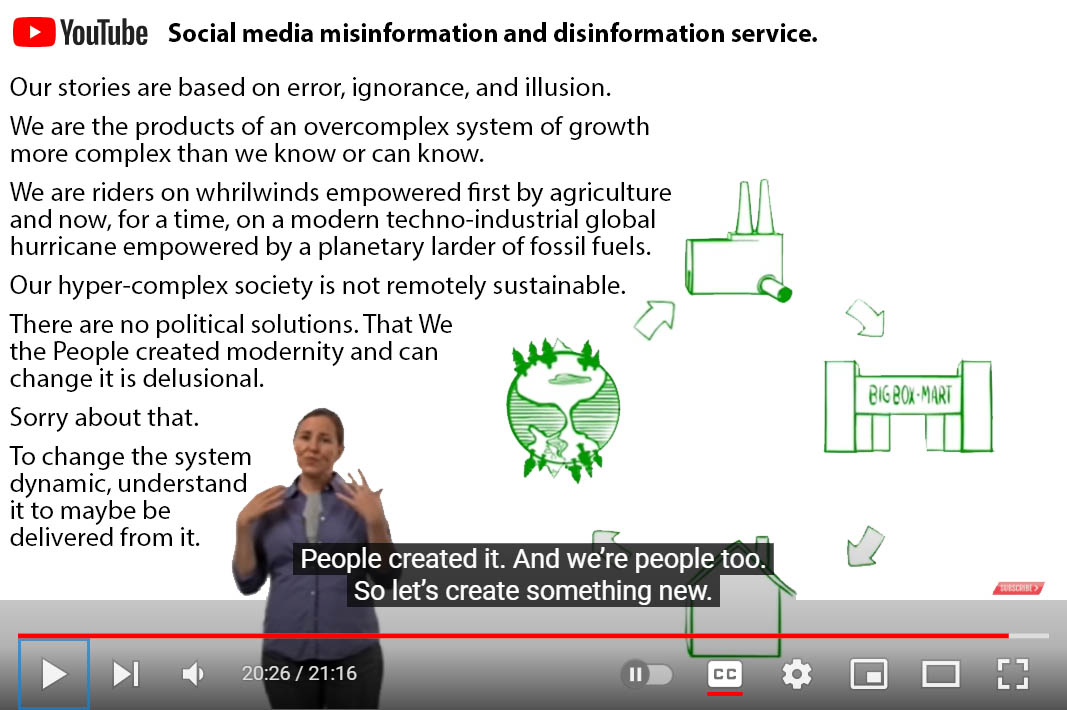
Note that people are mentioned, but no hint that there are or could be too many of them. Forget I=PAT. Our impact on our environment is due to a lack of green affluence and technology. And don't mention the Anthropocene mass extinction event. After we elect right thinking leaders to implement a Green New Deal, we'll collect DNA of all the species we drove to extinction and replicate them. Elon Musk can make a habitat on Mars for previously extinct animals. Mammoths will again walk the earth....
SUBNOTE TO FILE 5/19/22:
A big-picture view of humanity's problems if not solutions:
23:42 Ahead are a million unknown destinations. Some dark and foreboding, and some welcoming and beautiful. Many of us sense that something is different, something is coming, but we lack a shared understanding of the path that brought us here and of the terrain ahead.
24:03 Which future we expect depends upon which lens we use to see the road.
24:10 Modern society is polarized, stressed, and overwhelmed with information, good and bad. As a result, common points of view, our lenses, focus on the road just in front of us. For the view to the future, we defer to culturally accepted guides who are confident they know the way forward....
Full STOP. Yes, we are an energy blind superorganism headed for a Great Contraction, but omit the 'yes, but...' distractions. Yes, conventional economists, financial experts, technologists, thought leaders, scientists, academics, futurists..., clothes wearing humans vastly underestimate the challenges of avoiding a ghastly future, but....
Yes, 'the greatest shortcoming of the human race is our inability to understand the exponential function', but.... Yes, 'people would rather believe than know', but.... Yes, all prior empire building complex societies failed, but..., but adding an illusion is a self-inflicted distraction, a mental sleight of mind trick, allowing the but-space to be filled in with what one wishes to believe within the limits of nuance.
If there be exceptions (e.g. to complex societies that do not select for their own demise), how many? What percentage of humans are exceptions to the pattern of denial, obfuscation, and otherwise fooling ourselves (and thereby others)? How many people realize there are no true stories? To not ask is to be innumerate.
To ask what is the modern human condition, our problematique, and how we got into this fine mess of messes is a good start. To not ask, 'and then what?' is to be inecolate. If the ability to tell young people a narrative of past to present failures to foresee the foreseeable comes at a cost of letting them envision their perhaps or perhaps not ghastly future, then critical information about the probability of maybe or maybe not is being misplaced, is a Faustian bargin adding to an extinction debt posterity will have to pay.
Yes, there will be many stories told during climax and descent (degrowth/contraction/collapse) of how to make modern techno-industrial (MTI) society great again or at least persist by voting for a Green New Deal, et cetera. A 'great simplification' meme is so amorphous (like 'sustainable development') that some could interpret it to include a narrative of transitioning to a steady-state economy via a Green New Deal within which qualitative green growth is possible, if not bad growth.
There will be no consensus view. Even if there were, any plans made by the MTI collective based on that view could not turn things around before hitting the wall of biophysical limits. Our best laid MTI plans won't work to avoid dissolution of our now global, overcomplex, MTIed monetary culture/society/hegemon that is not remotely sustainable, whose dynamic we do not understand. I have watched relentless efforts to change society's course and calls to action (such as this one and the one coming soon) since Earth Day 1970. Meanwhile, 'the pace of planetary destruction has not slowed'. Sorry about that.
Tweaking/nudging/voting MTI society into its opposite may not be possible, may not be a viable plan. Perhaps soon (as finding a way out of our Wittgensteinian fly bottle, if possible, needs to be ASAP) 4.1 billion Anthropocene enthusiasts, whose enthusiasm has dimmed, may not be able to force the 3.9 billion, whose enthusiasm is undimmed, to change course even if they take (political) power in all countries and pass new laws.
The laws (i.e. natural) we need to follow are those not writ by human hand attached to silvered tongue. The 99+% of today are cluelessly unaware of what needs to be done to significantly increase the chances of a remnant population of functional humans persisting (being that all literate, if not numerate or ecolate, MTIed humans are products of the modern education system).
31:14 ...it is precisely thinking about these [future] pathways and actively choosing among them, which offers the only realistic hope for a long and meaningful human future. Nature has gifted us with a productive and beautiful home, the ability to understand how we got here, and the creativity to imagine which paths are possible. The future need not be dystopian, but cleverness alone will no longer suffice for the next leg of our journey. We will need imagination, foresight, empathy, and above all wisdom to navigate the path to the future that is arriving.
Such are the final thoughts of the video. Good news for 10 year olds?
If our next 50 year trajectory might not be good news for 10 year olds, I get no clue of how not good it might be. If I'm going 200 kph pedal to the metal towards a concrete wall and am told I'm 50 meters away from a direct hit, actively choosing a sapient pathway to a long and meaningful future might not be possible. Yes, but we are actually 150 meters away and there are many pathways....
Okay, but you don't even rate as a backseat driver and you're the only one in the car having existential concerns. Yes, hitting the wall could be avoided, but short of acquiring instant telepathic mind-control of the driver who is shocked and dismayed when they find themselves slamming on the brakes....
There will be only one future at every point of the endless now to come, and no one, no human agent, can know it or determine what will be. No one, not even the teaming billions, has a choice. All must be choicelessly obedient to the nature of things to persist or (without choosing to) go extinct. Our belief in choice is akin to our belief in human destiny. We moderns deeply believe in belief, but how's that been working for us?
 We cannot choose our truths nor our future. No one can know what the outcome of our endeavors may be. All images of the future, whether foreboding or beautiful, are illusions. What (as a would-be memetic species living in complex society) we can do is understand, iterate towards understanding. Or die as the animals we are, however dysfunctional.
We cannot choose our truths nor our future. No one can know what the outcome of our endeavors may be. All images of the future, whether foreboding or beautiful, are illusions. What (as a would-be memetic species living in complex society) we can do is understand, iterate towards understanding. Or die as the animals we are, however dysfunctional.
To understand involves listening to Nature who alone has all the answers about what works to persist. Listening to primate prattle (or the buzz of flies in a fly bottle) or the voice in our head is not listening. Listening involves becoming attuned to the still, small 'ring of truth' as Philip Morrison listened for.
The video is a consensus narrative Nate and his collaborators together strove to tell, a story that is reason and evidence based, a likely story, about our past to present trajectory, but feel-good belief based in looking nebulously ahead with added hand waving.
There is no consensus about who will be injured in the simplification/contraction to come and how they will die (e.g. the poor and non-combatants mostly starve and the rest by conflict related death), or how many will die (e.g. 80% to 100%) with today's 50-60 year olds having maybe a 50:50 chance of dying a natural death by old age/decline, and 1-10 year olds having maybe a 10 percent chance of dying of old age (or a much less change of becoming transhumans and living forever).
Those who would rather know than believe will wonder who, how, and how many may be injured/die as the global economy is simplified as the Late Bronze Age complex societies and Indus Valley Civilization were simplified.
Telling likely stories about our past seems vastly easier to iterate towards a consensus view about than extending best-guess systems thinking into our near future (based on less evidence which makes doing so more difficult), but the vastly more difficult (to impossible for most) part may have more to do with a would-rather-believe-than-know component that limits our potential for foresight intelligence.
As is our sort of understanding (information set), so will be our activity and outcome (i.e. to persist or not) as is true for all gene-based evolvable systems. We are the first potentially memetic-genetic species we know of, but so far we (as a complex social dynamic plus technology expressed as a dissipative structure) have selected to be the last hominin standing, and unless a memetic mutation arises and persists (is selected for), we will not persist (short of the unforeseeable). 'If this be error and upon me proved', then, as I'd like to be wrong about everything, I'll happily stand corrected.
That we can envision a future is what storytelling animals do, but the story that we can make our visions real, happen, by truly believing in our visions (with imagination, foresight, empathy, and above all wisdom) is a blinding illusion. We can never know truth (apart from tautologies), but we can iterate towards knowing (having some grasp of what's out there outside the model we socially construct of the what-is). We can never predict nor foresee the future of complex systems in any detail, but we can guess-then-test to perhaps iterate towards a viable complex society able to persist. Underestimating the difficulty will (likely) be fatal. We are playing, with extreme incompetence, a high-stakes endgame.
To envision 'we' persisting as 8 billion humans, however, is an illusion. Can 8 billion humans walk away from modern techno-industrial society to form a viable ecolate civilization able to support them? I can envision a pathway (involving a managed rapid 50-year birth-off event to avoid a chaotic die-off to dissolution) that would scale up, but not that 8 billion people (or even a majority) will 'choose' other than to keep on keeping on in pursuit of MPP/MePP short-term self interests (enabled by a lack of foresight intelligence).
Stick your head outside your pseudo-tribal consensus-narrative echo chamber if you think the needed change can rapidly happen on a global scale by choice. [The needed change will occur by selection, not choice, as per the nature of evolvable systems].
Can 8 million humans walk away from modern techno-industrial society in such a way as to thereby persist? I don't know, but I'm guessing that if only 8 to 800 do (hasn't happened yet), that that will likely not be a viable number. What if 8,000 to 80,000 do? Would that be enough? Perhaps.
I have failed to ask 80 thousand humans (0.001% of humanity) if they are prepared to walk away (from Omelas or the society that spawned them), away from the normalized life of pathology they live as humans of NIMH within a metastasizing growth dynamic. But of those whose sustanability concerns I have assessed (over 15k in the last seven years), I can count one 'maybe', so objectively the answer is no.
That there are real solutions to the human predicament is not an extraordinary claim, but the conjecture that more than a fraction of a fraction of one percent can currently consider real solutions (ones not politically viable) is not evidence-based. That things change, however, is a given that does not involve hope.
That as many as 8 million humans could pass through the coming bottleneck within a potentially viable social system (by intent/best-guess based on foresight intelligence) is to consider as a (perhaps far too optimistic) possibility. That non-viable social systems having no long-term future (e.g. Late Bronze Age Collapse Sea and Land Peoples) may inherit the rubble (for a time) is also to consider. If they number 800 million and those who transitioned intentionally number 8 million (or 8k), then what? Will the 8 million be able to persist over an 8 to 20 generation time period during a great simplification event while recovering functional behaviors (reversing the behavioral sink effect of the prior 8 to 20 generations of overdensity living) while the 800 million continue on the downslope to dissolution as usual? [To envision humanity's life on the downslope as lasting 50 years, two generations, may be to fatally underestimate the challenges of passing through the foreseeable eye-of-the-needle that may come this century.]
I'm guessing some fraction of a fraction of a percent of humanity (<0.01%) will watch the above video or consider the information offered in it in any form, and that of them, some fraction of a fraction of a percent (<0.0001% of humans) will not fatally underestimate the difficulty of avoiding a ghastly future to thereby maybe persist long term. If 8k-800k humans have enough foresight intelligence to pass through the coming sieve (the Great Selection), will that be enough? I don't know.
What I can say is that I have no evidenced-based reason to claim that more than 8k humans may have the potential of not seriously (i.e. fatally) underestimating the challenges of avoiding a ghastly future. That 8k MTIed humans of our Civ 3.x society could vote with their feet and auto-organize (having a life-driven purpose) into transitional Civ 4.x societies that endeavor to iterate towards a viable Civ 5.0 (to 5.1 etc. as it would be evolvable) in only 8 to 20 generations of endeavor to, by intent, do so is not currently looking possible, but things change, and chance persistence will favor prepared minds.
So far as I can assess, no one who shares my view that we have a problematique (namely overshoot, e.g. Nate and friends), foresees foundational change as needed (there are exceptions I have come to know of, but I can count them on one hand). But as an extreme cornucopian optimist living on an abundant (somewhat less but potentially again) Earth, I foresee that at some point there could be a 2x4 upside humanity's head that gets people's attention, that shatters our collective complacency, error, ignorance, and illusion via disbelief. Maybe 8k people could then take a life-driven interest in designs for a viable civilizations (when they see that their Civ 3.x isn't viable). So all you designers out there, start designing now, or rue the day.
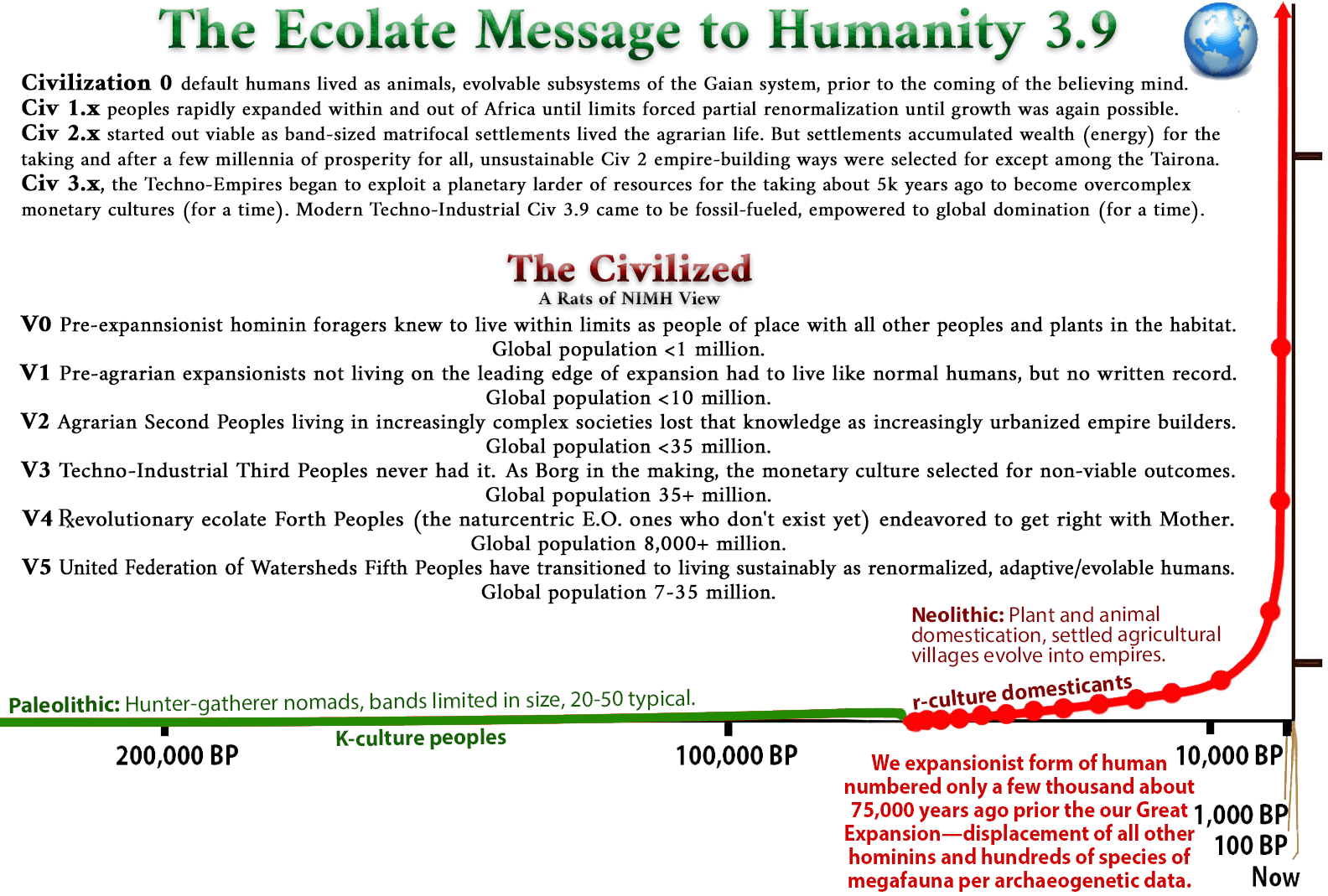
[The early ecolate came to be called the 'E.O. ones', mindless followers of the ecofascist
anti-human E.O. Wilson who advocated for merely a Half Earth for humanity.
The EOs came to accept the term but translated it as 'ecolate ones'.
Civ 4.x would be transitional, likely taking 8-20 generations by following the prime directive:
each generation must objectively become more functional than the last to become Civ 5.0
containing humans who can understand the planet and live with it properly (to persist).
It's been a long way up as it will be down, see full graph.]

